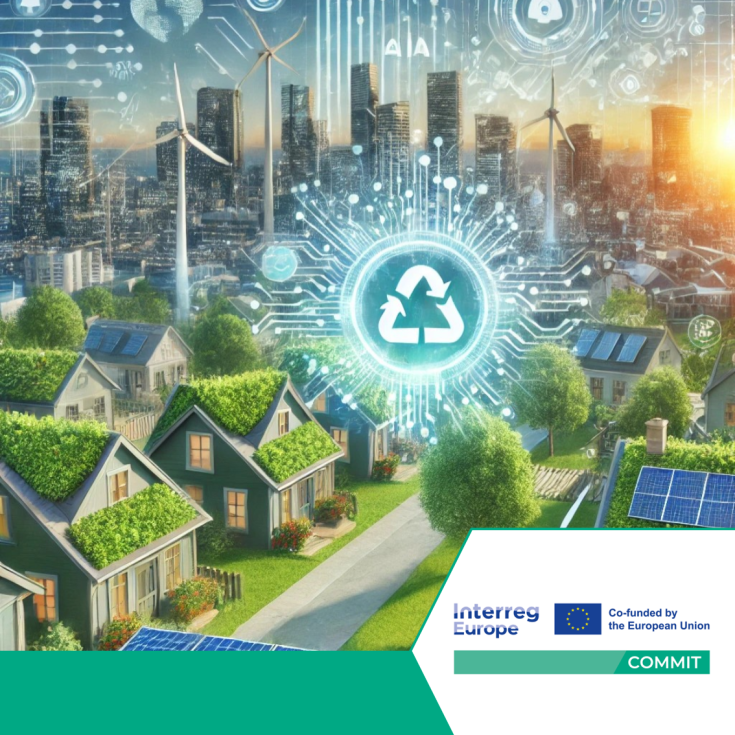A REDASP Reflection: Improving SME Access to Skills
Serbian partner REDASP reflects on skills access
Green and digital transitions are reshaping the way we live, work and interact. The world economy is moving to a resource-efficient, circular, digitised and climate neutral. Decarbonization of production processes is an essential step towards achieving environmental sustainability and combating climate change. The COMMIT project’s goal is to assist SMEs in navigating this industrial transition by adapting to decarbonisation, maintaining quality jobs and addressing regional inequalities.
The power of knowledge and skills is an investment that leads to business success, which is why continuous improvement of qualified personnel, and the creation of new employment opportunities is essential. Skills and lifelong learning are key to sustainable growth, increased productivity, and innovation, and therefore to the competitiveness of businesses, particularly SMEs.
Employment Challenges
The energy sector plays a key role in the decarbonization process, followed by industries such as construction, transportation, agriculture. These are specific economic sectors where, in addition to highly skilled and trained engineers, a significant number of specialized professionals are needed. Vocational education, therefore, holds a vital role in this process but evidently faces significant challenges and ongoing reform efforts aimed at adapting to the needs of modern society and the labour market.
Planning and Designing Future Jobs
In a context of rapid industrial development and transformation, the educational system fails to respond swiftly enough in terms of enrolment policies and advanced curricula. For planning and designing future jobs, educational institutions must utilize the resources and capacities of companies that possess modern machinery, manage production processes and generally have sufficiently experienced staff who can transfer knowledge to new employees.
MIND Park is an integrated production, technology, and logistics hub in Kragujevac dedicated to the rail industry and in cooperation with the Faculty of Engineering, a new master’s degree is being established that enriches the education of professional staff in the field of Mobility Systems Engineering. After graduation, students can do an internship in one of the companies within the MIND Group.
More Flexible Educational Initiatives and Support for Youth
Simultaneously with the improvement of the educational system, a more agile response can be achieved through the implementation of workshops, projects, and services. Different organizations are active in vocational training, guidance, certification of skills, social inclusion, employability promotion, job integration, and equal opportunities, in collaboration with business support associations, Vocational Education and Training Centres (VET), Centres of Vocational Excellence (CoVE), and similar networks that primarily target youth, especially those belonging to vulnerable groups facing social exclusion, poverty, or discrimination. This includes NEETs (not in education, employment, or training) with low educational attainment, youth with special needs, early school leavers, and migrant youth. CoVEs are improving work quality, opening to new actors in different sectors, building the capacity of organizations, meeting the needs and priorities in specific areas, enabling transformation and changes, leading to improvement and new approaches. They closely collaborate with employers, including small and medium-sized enterprises, to foster innovation, applied research, entrepreneurship, and retraining.
Investment in Training and Professional Development
The provision of purchasable tailored training for companies is now common. Training centre which offers formal adult learning and lifelong professional and practical oriented training, upskilling and reskilling for a variety of target groups, such as employed and unemployed individuals, companies, craftsmen and teachers are more than welcome. In Serbia, the Subotica Tech-College of Applied Sciences organised courses to reskill employees of one company who lacked specific qualifications when entering the EU market. The company approached the school, requesting tailored made courses, which resulted in the establishment of close cooperation between the two.
Think Green, Act Green
The green transition requires investments in skills to increase the number of professionals who build and master green technologies, develop green products, services and business models, create innovative nature-based solutions and help minimise the environmental footprint of activities. By identifying, analysing and exchanging good practices, COMMIT creates place-based strategies, tools and governance frameworks to effectively support low-carbon entrepreneurship. Europe will only become a climate neutral, a resource efficient society and a circular economy with an informed population and workforce that understands how to think and act green.

